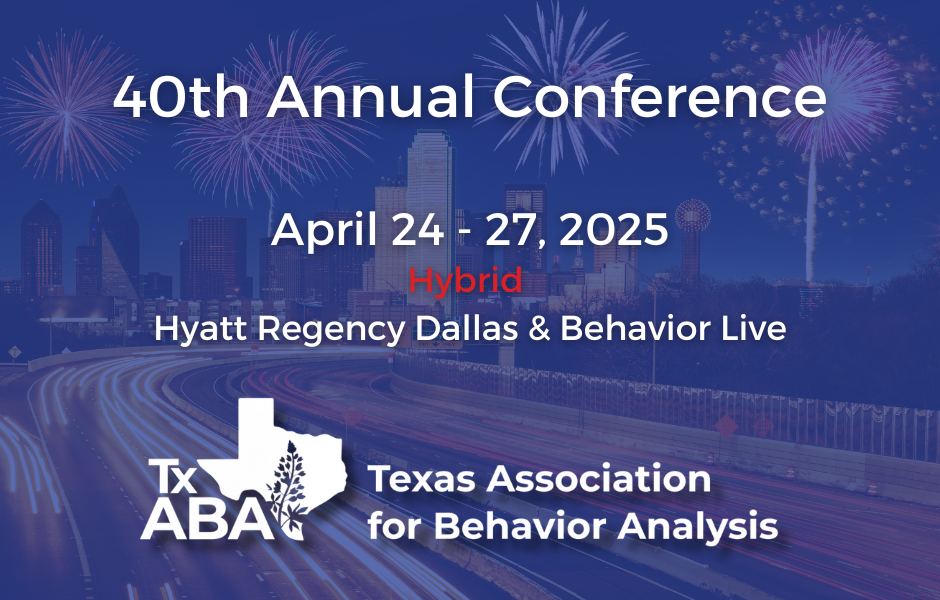
2025 Pre-Conference Workshops
General Information
When: Thursday, April 24, 2025
Where: Conference hotel Hyatt Regency (IN-PERSON ONLY)
TxABA Member Pre-Conference Workshop Registration and CEUs: $80 for 3-hr workshops and $150 for 6-hr workshops
The membership price for workshops will not appear on the purchasing page unless your membership is current. At this time, it is not possible to purchase a membership and get the member rate for workshops on the same transaction.
Non-Member Pre-Conference Workshop Registration and CEUs: $120 for 3-hr workshops and $225 for 6-hr workshops
We encourage those interested in attending a pre-conference workshop to register by March 11, 2025. We will review registration numbers mid-March and low registration workshops may be canceled. On-site registration may be available if seats are still available and instructors have enough materials.
Please note that workshop instructors may promote their own books, curricula/materials, or services. Workshop registrants' names and email addresses will be shared with workshop instructors, you may receive emails from them before or after the workshop.
How to Register
1) Log into your TxABA Account (person icon at the top right) or create a free TxABA account (person icon at the top right)
2) Click on Register on the top page menu or click here
3) Remember the membership registration price for pre-conference workshops will not be available unless your membership must be current
- you CANNOT purchase membership at the same time as a pre-conference workshop
4) Select the workshop(s) you want to register for, please remember that workshops are In-Person Only
5) Select the box to agree to Terms of Service
6) Select Submit to go to your cart
7) Please review your cart, the total is the price you will pay
8) Select to Pay with Card to complete the purchase or Pay by Check - If paying by check, please read the instructions & confirm as you cannot come back to pay by card later
9) You will receive a confirmation email for each pre-conference workshop that you register for with information
Pre-Conference Workshop #1
Supporting Multi-Tiered Systems of Supports (MTSS) in Public Schools

Instructors: Season Almason, MA, BCBA and Katy Mattern, M.Ed., BCBA, LBA
Time: 10:00 am - 1:00 pm AND 3:00 pm - 6:00 pm
Duration: 6 hours
BACB CEUs: 6 CEUs Available
Format: In-Person
Abstract: Public schools across the nation are becoming more aware of the benefits of employing BCBAs to support all students, not just students who qualify for special education services. Many schools utilize MTSS systems to both prevent and respond to students’ behavior, social emotional, and academic needs; however, MTSS is not part of the 5th Edition Task List and many trainees do receive training in MTSS as part of their fieldwork or practicum experience. Participants of this workshop will learn strategies specific to working in public school settings and supporting building- and district-level MTSS systems; specifically, how to support school teams in assessing the fidelity of tiered behavior management systems, how to use the results of that assessment to support school teams in improving implementation, and how to support staff in collecting data to evaluate the effects of tiered interventions on student behavior.
Learning Objectives:
- 1) Attendees will learn how to conduct the Tiered Fidelity Inventory (TFI).
- 2) Attendees will use the results of the TFI to create action items for school MTSS teams.
- 3) Attendees will learn to support school teams in evaluating current classroom and schoolwide behavior response systems and practices.
- 4) Attendees will learn to select user-friendly data collection systems that school staff are likely to use.
- 5) Attendees will train school staff to collect student behavior data.
- 6) Attendees will identify evidence-based interventions at each MTSS tier.
- 7) Attendees will train staff to implement interventions at each MTSS tier.
- 8) Conduct and write FBAs that are compliant with special education laws.
Instructor Bios:
Season Almason is the Director of Special Education for the West Valley School District in Yakima, Washington. Season grew up in central California and fell in love with ABA while completing her undergraduate degree in Psychology at California State University, Stanislaus. Season completed her graduate training at Western Michigan University in 2008 and became a BCBA in 2009. Season has worked in the field of behavior analysis in many different capacities since 2002. Season has worked as a consultant and employee in multiple school districts since 2011. For the past 5 years, Season has served as a district-level administrator in the West Valley School District and was promoted to Director of Special Education at the beginning of the 2023-2024 school year. In addition to her applied work, Season has taught undergraduate courses at Western Michigan University and graduate-level courses at Central Washington University and Southeast Missouri State University (online).
Katy Mattern is a Board Certified Behavior Analyst (BCBA), Certificated Teacher, and ABA Program Manager for the Yakima School District, the largest school district in central Washington state. She earned her bachelor’s degree in Psychology from Washington State University in Pullman, WA. She went on to earn her master’s degree in Elementary Education from City University of Seattle and began teaching in 2012. Katy taught 2nd grade and 3rd grade where she realized that many teacher preparatory programs do not do an adequate job providing future educators with a solid understanding of human behavior. Katy completed her BCBA coursework through Florida Institute of Technology. In 2018, she began working for the Educational Service District 105, where she was able to share her passion for ABA with other educators. During her time with the ESD, she provided professional development on the topics of classroom management, Multi Tiered Systems of Support (MTSS) and positive behavioral interventions support (PBIS) to over 23 school districts before accepting a position in Yakima for the 2023-2024 school year.
Pre-Conference Workshop #2
Shifting the Balance of Performance using the Deliberate Shift Tool.

Instructor: Nicholas Weatherly, Ph.D., BCBA-D
Time: 10:00 am - 1:00 pm
Duration: 3 hours
BACB CEUs: 3 SUPERVISION CEUs Available
Format: In-Person
Abstract: Leaders serve a critical role in any organization to set people up for success and support people in achieving outcomes valued by the individual, the organization and consumers. A behavior-analytic approach to leadership involves understanding why certain behavior patterns are occurring and using that information to make informed decisions to maximize the impact of a given leadership solution. This is the role of performance diagnostic tools, one of which being the Deliberate Shift Tool (DST). The DST makes it quick and easy to make the shift from undesired behavior to desired behavior by assessing what elements in the workplace are causing performance problems to occur. The purpose of this workshop is to practice using the DST to address antecedent needs, environmental barriers, competing contingencies, and other factors that can be used to help shift performance from undesired behaviors to desired behaviors and maximize results.
Learning Objectives:
- 1) The participant will be able to describe the five areas of the Deliberate Shift Tool
- 2) The participant will be able to use the Deliberate Shift Tool to capture variables in the environment responsible for current levels of performance.
- 3) The participant will be able to use the Deliberate Shift Tool to identify cause-based leadership solutions.
Instructor Bio:
Dr. Nicholas Weatherly is a senior-level executive, leadership coach, researcher, and author with over 20 years of success leading progressive people operations. An experienced international consultant, coach, and speaker, Dr. Weatherly is the managing director of NL Weatherly Inc., maintains a line of research on leadership and coaching through Endicott College, has served as the Head of the School of Behavior Analysis at the Florida Institute of Technology, and was a management consultant with Aubrey Daniels International. He is the Past-President of the Association of Professional Behavior Analysts, the Georgia Association for Behavior Analysis, and the Kentucky Association for Behavior Analysis, and was the inaugural chair of the Kentucky Applied Behavior Analysis Licensing Board, the first stand-alone licensing board for behavior analysis in the country. He received his Ph.D. from Western Michigan University, currently serves on the Editorial Board of the Journal of Organizational Behavior Management, is a Board Certified Behavior Analyst-Doctoral®, and co-author of 3 books on Deliberate Coaching.
Pre-Conference Workshop #3
Staff Training in Adult Service Settings: Key Components to Facilitate Safety and Skill Acquisition

Instructor: John Guercio, Ph.D., BCBA-D
Time: 10:00 am - 1:00 pm
Duration: 3 hours
BACB CEUs: 3 CEUs Available
Format: In-Person
Abstract:
The present workshop will identify key aspects of staff training for direct support professionals (DSPs) or Registered Behavioral Technicians (RBTs) or other staff that work in environments where adults with intellectual and developmental (IDD) and Autism Spectrum Disorders (ASD) are served. Crucial components of organizational behavior management (OBM) will be detailed as they apply to training staff that work with adults with significant behavioral issues and trauma histories. The workshop will also enumerate the process by which skill building can be taught in adult service settings and the manner in which staff can be trained to do so. Central to these concepts is the presence of trauma for staff working in settings where extreme aggression may exacerbate these issues and how staff can engage in wellness practices to combat these potential obstacles in their work environments. Attendees will be provided with several examples of the application of behavioral science to staff training in environments where the level of risk is elevated and skill building is a must. Specific peer-reviewed research will be presented that provides the evidence base to the issues being discussed.
Learning Objectives:
- 1) Participants will select different performance deficits of direct support staff (DSP) as they are encountered in the residential setting.
- 2) Participants will identify the role of organizational behavior management (OBM) in training residential staff in settings where severe aggression is displayed.
- 3) Participants will match different staff training approaches along with their efficacy and outcomes.
Instructor Bio:
Dr. Guercio has spent much of his career researching effective staff training protocols and behavior intervention strategies for staff and clients in treatment settings for clients with severe aggression. Since obtaining his master’s and doctoral degrees in behavior analysis and therapy from Southern Illinois University at Carbondale, Dr. Guercio has worked in settings serving as Director of Behavioral Services for the Missouri Department of Mental Health, and as Vice President of Clinical Services and Research at the Judevine Center for Autism/TouchPoint Autism Services in St. Louis. He also serves as adjunct faculty in the behavior analysis department at Washington University and St. Louis University. He has also given more than 500 presentations at behavioral conferences and authored and/or co-authored over 60 articles in peer reviewed journals as well as written several book chapters related to the treatment of intensive behavioral issues. He has authored or co-authored 4 books; Assessment of Adult Core Competencies: Teaching Skills to Adults with Autism and Severe Behavioral Challenges; Behavioral Relaxation Training Clinical Applications with Diverse Populations; PAADS; Protocols for Adolescents and Adults with Severe Disabilities in the Transition to Adulthood; and A History of the Behavioral Sciences: Theoretical Underpinnings and Historical Development. Dr. Guercio serves on the Board of Editors of Behavior Analysis Research and Practice; Behavior Analysis and Practice; Advances in Neurodevelopmental Disorders, and a reviewer for the Journal of Applied Behavior Analysis and Research in Developmental Disabilities. In his career, Dr. Guercio has helped design and run a program for individuals with sexually deviant behavior and substance abuse issues and has developed an entire treatment protocol based upon that program. In his current role at Benchmark Human Services, Dr. Guercio serves as the Clinical Director. He oversees the continuing education and clinical consistency across the behavior analysts across all the 20 states that Benchmark does business in. He develops and delivers behavioral services for clients with significant aggression and high-risk behavioral needs, many of whom have been institutionalized in forensic settings for more than 20 years, often under mechanical restraints and heavy medication. Through Dr. Guercio’s leadership, many clients’ have achieved higher levels of autonomy and become more active participants in their communities. Dr. Guercio currently serves on the ABAI Licensing Committee and is a board member of the Missouri Association for Behavior Analysis.
Pre-Conference Workshop #4
Boosting Caregiver Buy-In: Practical Tools to Increase Collaboration

Instructor: Leanne Page, M.Ed., BCBA, LBA
Time: 10:00 am - 1:00 pm
Duration: 3 hours
BACB CEUs: 3 CEUs Available
Format: In-Person
Abstract:
Effective caregiver collaboration is often a challenging aspect of practice for many BCBAs and is absent from formal training programs (LeBlanc, Taylor, & Marchese, 2020). Research shows that compassionate caregiver support can increase outcomes for clients (Taylor, LeBlanc, & Nosik, 2019), but what steps can practitioners actually take? This hands-on workshop will provide behavior analysts with practical tools to foster caregiver buy-in, enhance communication, and align their interventions with family values (Plumb, Stewart, Dahl, & Lundgren, 2009; Whittingham & Coyne, 2019).
Participants will leave equipped with strategies that bridge the gap between technical behavior analysis and compassionate, values-driven parent training.
Learning Objectives:
- 1) Participants will identify strategies to encourage dialogue with caregivers.
- 2) Participants will create their own visual supports and tools for collaborative communication with caregivers.
- 3) Participants will create individual self reflection templates for self assessment based on compassion and communication research.
- 4) Participants will engage in Behavior Skills Training/ role playing in small groups to practice using coaching questions that drive collaboration.
- 5) Participants will complete values clarification exercises for themselves and then practice guiding someone else through exercises in a small group or partner format.
Instructor Bio:
Leanne Page is a board certified behavior analyst, approved BACB continuing education provider, parent coach, mom of two, founder of Parenting with ABA, and best-selling author of Parenting with Science: Behavior analysis saves mom’s sanity and Enjoy Parenting: The busy mom’s behavior toolbox. Leanne has taught over 40 continuing education courses all focused on compassionate caregiver support.
Leanne’s mission through Parenting with ABA is two-fold: 1) to make the science of behavior accessible to all parents; and 2) to help behavior analytic practitioners to infuse their services with compassion, particularly in the area of caregiver support.
Pre-Conference Workshop #5
Work-Life Harmony in Action: Strategies for Supervisors to Thrive and Lead

Instructors: Ellie Kazemi, PhD, BCBA-D
Time: 3:00 pm - 6:00 pm
Duration: 3 hours
BACB CEUs: 3 SUPERVISION CEUs Available
Format: In-Person
Abstract:
Occupational wellness is the ability to balance work productivity and self-care to promote health, personal satisfaction, and work satisfaction. Achieving a healthy work-life balance requires that supervisors develop occupational wellness skills and employers to foster occupational wellness skills by setting the occasion for such skills to be rewarding and sustainable. Supervisors often face emotionally taxing demands—needing to be decisive, productive, dependable, and efficient while simultaneously being caring, compassionate, and understanding. In the face of these pressures, occupational wellness skills are essential for combating burnout and fostering resilience.
This interactive workshop invites participants to go beyond understanding the research on compassion fatigue and burnout. Together, we will explore core occupational wellness skills every great supervisor must master to thrive. Through guided activities, collaborative discussions, and shared insights, we will work as a group to identify practical strategies and create personalized action plans for fostering occupational wellness. Come prepared to reflect, contribute ideas, and leave with a roadmap to enhance your well-being and that of your team. Let’s find solutions together and support each other in building a healthier, more sustainable approach to supervision.
Learning Objectives:
- 1) Attendees will be able to explain one way they can work smarter, not harder, as supervisors.
- 2) Attendees will be able to state at least 3 skills an effective supervisor can gain to combat burnout.
- 3) State exactly the steps they need to take to improve at least 3 occupational wellness skills.
Instructor Bio:
Dr. Ellie Kazemi has worked internationally (e.g., in China, S. Korea, Norway, and Italy) and is well-recognized as a public speaker. She has also led large-scale efforts in standard development, evaluation methodology, measurement science, outcome assessment, and value-based care at an accreditation organization. She is the founder of a successful self-supported graduate program in behavior analysis at CSUN, where she is tenured as a professor of psychology and the Director of AI/VR/AR Initiatives. In 2015, she authored “Fieldwork and Supervision for Behavior Analysts,” which is currently recognized as one of the primary sources for supervision training in the field of ABA. She has also published numerous peer-reviewed publications on training, turnover, conflict management, and leveraging advanced computer technology (e.g., A.I., V.R., and robotics) for simulation-based learning. She has been a principal investigator on large national multidisciplinary research grants (e.g., with FEMA and NASA) focusing on effective training and measuring outcomes. Her efforts have been recognized through several awards, such as the ABAI Best Mentor Award and the Outstanding Service to the Community Award. See more by going to elliekazemi.com.
Pre-Conference Workshop #6
The Mental Health Parity and Addiction Equity Act: What Behavior Analysts need to know

Instructors: Mariel Fernandez, MS, BCBA, LBA, Anna Sciarillo, MA, BCBA, LBA, and Ellen Rhoads, MS, BCBA, LBA
Time: 3:00 pm - 6:00 pm
Duration: 3 hours
BACB CEUs: 3 ETHICS CEUs Available
Format: In-Person
Abstract:
The Paul Wellstone and Pete Domenici Mental Health Parity and Addiction Equity Act of 2008 (MHPAEA) is a federal law that prevents group health plans and health insurance issuers that provide mental health or substance use disorder (MH/SUD) benefits from imposing more restrictive benefit limitations than for substantially all of the medical/ surgical benefits.
On September 9, 2024, the U.S. Departments of Health and Human Services (HHS), Labor, and the Treasury released new final rules implementing MHPAEA. The new final rules clarify requirements for individual and group health plans, including Medicaid MCOs, and reduce administrative burden to access care, including how and when health plans are required to complete and provide parity analysis to demonstrate compliance with MHPAEA.
MHPAEA is one of the most powerful regulations in place that supports access to medically necessary care. Behavior Analysts must have a fundamental understanding of MHPAEA protections and parity requirements to effectively advocate for medically necessary services, appeal denials or partial denials, and meet ethical obligations for their clients. This workshop will provide a high level overview of MHPAEA, how and when it applies, what behavior analysts should know about the 2024 final rules and policy revisions, and how regulators at the Texas Department of Insurance (TDI), Department of Labor (DOL), and The Health and Human Services Commission (HHSC) can help ensure payor compliance.
Learning Objectives:
- 1) Participants will define parity and when MHPAEA applies to ABA services.
- 2) Participants will identify common quantitative and non quantitative treatment limitations in the provision of ABA.
- 3) Participants will learn how to utilize MHPAEA during peer reviews and appeals to better advocate for access to medically necessary care.
- 4) Participants will explain the importance of a parity analysis, how one can be requested, and how it assists with advocacy efforts.
- 5) Participants will explain how to report a parity concern to regulators at TDI, DOL, or HHSC.
- 6) Participants will identify what information to provide regulators, to better advocate for medically necessary care.
Instructor Bios:
Mariel Fernandez is the Vice President of Government Affairs for The Council of Autism Service Providers. Mariel is a Board Certified Behavior Analyst, BCBA, and a Licensed Behavior Analyst, LBA, in Texas. She began working in the field of Behavior Analysis in 2001 and pursued her master’s degree in applied behavior analysis from Auburn University in 2004. Mariel has effectively advocated for improved access to care on the micro and macro levels, including supporting advocacy, public policy, and legislative initiatives across all 50 states and D.C.
Mariel is also a member of the Texas Department of Licensing and Regulation, TDLR, Behavior Analyst Advisory Board and President of the Texas Association of Behavior Analysis, TxABA, Public Policy Group, where she helped to pass behavior analyst licensure and the autism services benefit, including ABA, through Texas Medicaid. She also serves as a subject matter expert for the Policy Council on Children and Families.
Anna Sciarillo is a BCBA based in San Antonio, Texas, and currently serves as the Vice President of Intake and Marketing at Empower Behavioral Health. Since beginning her career in ABA in 2010, Anna has gained experience in clinic-based, in-home, and community-based services for individuals with autism. She earned her bachelor’s degree from Louisiana State University and her master’s degree in special education, with a focus on ABA, from The University of Texas at San Antonio. In addition to her role at Empower, Anna is actively involved in ABA advocacy, serving as Secretary for the Texas Association for Applied Behavior Analysis Public Policy Group (TxABA PPG) and Chair of its Medicaid Task Force.
Ellen Rhoads is a Board Certified and Licensed Behavior Analyst. She received her Master's degree in Applied Behavior Analysis from Auburn University. She then moved to Texas to work for Texana Center in 2005. While at Texana, she worked as a BCBA training teachers on the principles and application of ABA, a clinical team supervisor, and as the Senior Manager. After starting a family, Ellen and her family moved to northwest Arkansas. Ellen continues to work for Texana Center as the specialized Services Project Manager. Ellen serves as the President-Elect of the Texas Association for Behavior Analysis Public Policy Group and the chair of the same organization’s Insurance Task Force; she also serves as well as the chair of the Council for Autism Service Providers (CASP) Profound Autism SIG.
Pre-Conference Workshop #7
Public Speaking Skills for Behavior Analysts: Preparing and Delivering Professional Presentations

Instructors: Matthew Laske, PhD
Time: 3:00 pm - 6:00 pm
Duration: 3 hours
BACB CEUs: 3 CEUs Available
Format: In-Person
Abstract:
Whether presenting research or advocating behavioral practices, public speaking is a job requirement for many behavior analysts. Many behavior analysts frequently address interdisciplinary teams, collaborators, and colleagues, yet some may feel uneasy about public speaking due to limited formal training. In addition to presenting themselves effectively, behavior analysts are often tasked with persuading professionals in other disciplines about the validity of their science and practices. This workshop provides foundational knowledge and strategies for professional-level public speaking, including: planning for professional presentations, crafting compelling narratives, designing slide decks, stage presence, and general strategies for managing public speaking challenges. Attendees will leave the workshop with timelines for preparing talks (Reed, 2018) and tips to deliver memorable and impactful presentations (Laske & DiGennaro Reed, 2022, 2024). A distinct feature of this workshop is the inclusion of relevant behavior analytic studies and research-backed content provided by the workshop speaker.
Learning Objectives:
- 1) Attendees will be able to summarize existing research on how behavior analysts effectively communicate through public speaking.
- 2) Attendees will be able to describe strategies for planning professional presentations.
- 3) Attendees will be able to describe strategies for delivering effective presentations.
- 4) Attendees will be able to describe methods for evaluating public speaking effectiveness.
Instructor Bio:
Dr. Matthew Laske is an Assistant Professor at the University of North Texas. Matthew obtained his Ph.D. in Behavioral Psychology at the University of Kansas under the advisement of Dr. Florence DiGennaro Reed. He obtained his M.A. in Industrial- Organizational Psychology and Human Resource Management at Appalachian State University with Dr. Tim Ludwig. He is recognized by the Cambridge Center for Behavioral Studies (CCBS) as a Distinguished Scholar, where he assists the CCBS’s Commission on Behavioral Safety in documenting the best behavioral safety programs in the world over the last 15 years. Matthew co-authored the book The Science and Best Practices of Behavioral Safety, which describes one of the most mature and impactful applications of behavioral science. He has designed, implemented, and assessed behavioral safety programs. His research and expertise include behavioral safety public speaking/communication. He has presented at over 50 conferences, workshops, and other trainings on workplace behavior.
